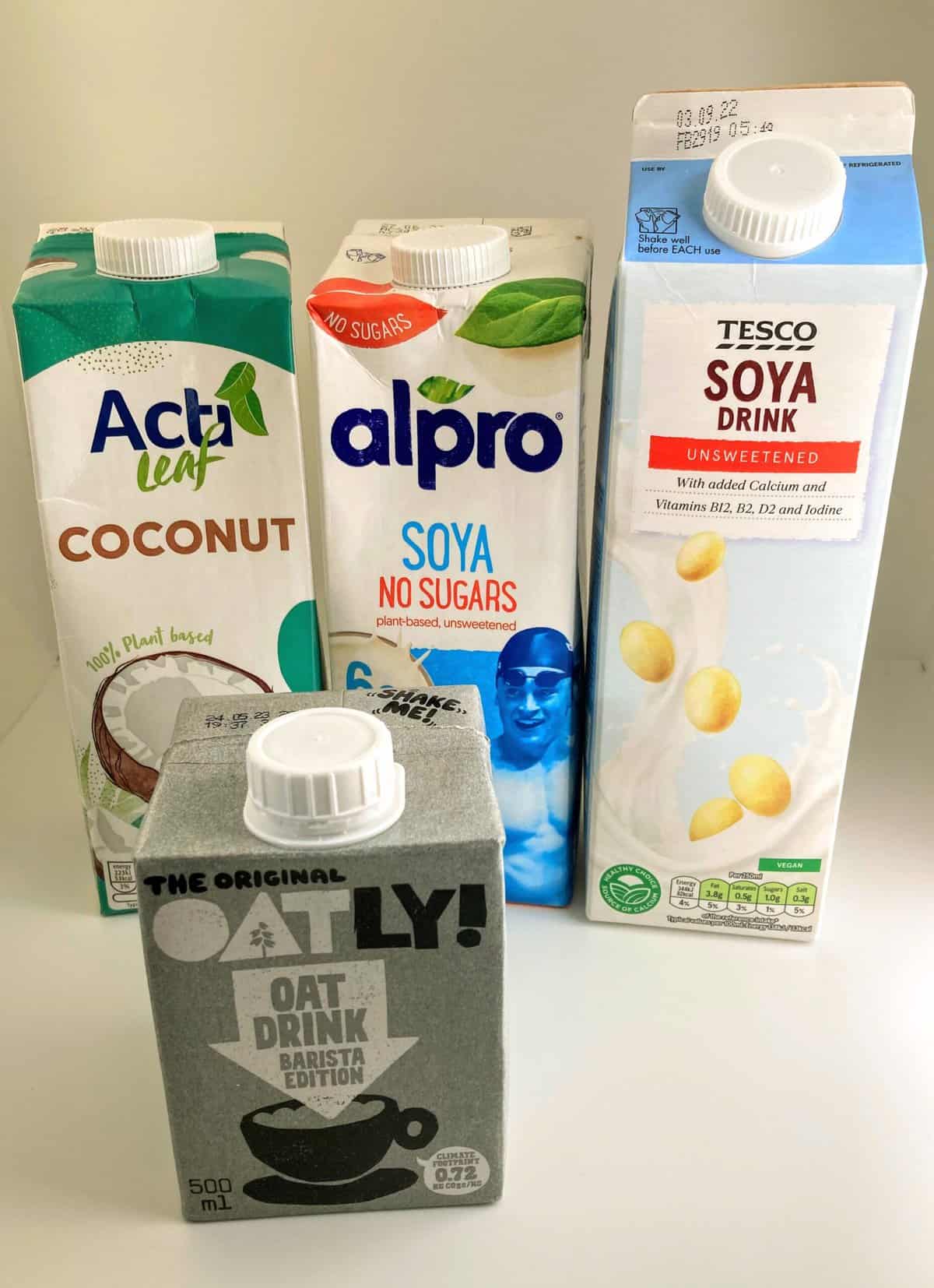 If you are looking for dairy-free milk these days, there are so many options to choose from. We all have our favourites but if you are new to choosing and buying dairy-free milk then it is easy to get a little overwhelmed by the choice. There are a few things that might help you narrow down your choices when deciding which dairy-free milk you might want to try. In this article, we highlight some of the factors that you may need to consider.
If you are looking for dairy-free milk these days, there are so many options to choose from. We all have our favourites but if you are new to choosing and buying dairy-free milk then it is easy to get a little overwhelmed by the choice. There are a few things that might help you narrow down your choices when deciding which dairy-free milk you might want to try. In this article, we highlight some of the factors that you may need to consider.
So where do you begin when choosing the best dairy-free milk?
Well, the first thing is to realise that there is no one milk is the best and to consider what it is you want from milk?
- What is your reason for buying dairy-free milk? Are allergies a concern?
- Do you need to worry about vitamins and minerals in the milk or are organic choices OK? Have you been advised by a dietician that you need fortified milk?
- Are you wanting milk that tastes best in drinks? Or are you looking for dairy-free milk that is similar in taste to cow’s milk?
- Or do you want to use the milk for cooking?
- Are you concerned about sugar content?
- Is the milk for a baby or toddler?
- Do you want fresh (chilled) milk or is UHT milk OK?
- Is price a deciding factor? Do you want to pay for branded milk, or can you consider the supermarket’s own brands?
- Are you looking for extra protein content matter in plant-based milk?
Before we go over these points, let’s look at what type of plant-based milk is available. I’ve listed as many as I know of below but this is an ever-changing product and more and more plants are being used to make milk, so I may have missed some. Please feel free to contact me if you think I need to add to this list!
- soya milk
- oat milk
- almond milk
- coconut milk
- hazelnut milk
- hemp seed milk
- cashew milk
- pea protein milk
- potato milk
- rice milk
In addition to the above, you will find blends such as oat and hemp. It’s easy to get bamboozled with so much choice, so I would suggest you try and narrow down what it is you need from the milk you choose.
Things to consider when choosing the best dairy-free milk for you.
Let’s look at the points mentioned above individually.
What is your reason for buying dairy-free milk?
It may be this is a lifestyle or ethical choice based on your beliefs or environmental factors. If that is your only reason for avoiding dairy milk then the choice is wide open for you on this point. However, if you need to avoid dairy for medical reasons then it may not be so simple. If you have been advised to cut out dairy milk is it because of an allergy? This would be the first step in making choices about the best dairy-free milk. Is it just dairy-milk you need to avoid or perhaps nuts or legumes are a problem? As ever, you should always read the ingredients label for what other ingredients are included. For us, fava beans or aquafaba would be a problem if it was listed in the ingredients.
Organic vs Fortified Milk? Is the milk for a baby or toddler?
If you have a restricted diet due to an allergy to dairy you may have been advised on drinking fortified milk. This may rule out organic dairy-free milk unless you have alternative sources of these nutrients included in your diet. I’m not against buying organic plant-based milk at all, but for the health of my daughter, our dietician advised us to purchase non-organic, fortified milk to ensure sufficient calcium. Our daughter had a severely limited diet and it was difficult to supplement the missing nutrients with food. Is the milk for a toddler? If so, you might want to consider dairy-free milk aimed specifically at this age group.
Do you want extra protein per serving?
Alpro is now selling milk that has additional plant protein in it. A quick look at the nutritional labels shows me that a regular carton of Alpro soya milk contains 3g of protein per 100mls of milk, compared to their Alpro Protein milk which has 5g of protein per 100mls of soya milk. If you are looking to boost your intake of protein then perhaps this is helpful.
Is taste the most important factor for you?
We all want milk that tastes good, and it may be that is the most important factor for you. If you are looking for milk that tastes similar to cow’s milk, then taking any allergies into account, you may want to consider soya or oat milk as they are the most similar in taste. These are suitably bland in tea or coffee. You can even find, milk that is compared to whole milk and semi-skimmed cow’s milk. Alpro has even developed soya milk specifically for a cup of tea, branded as MyCuppa. Some people love the taste of nut-based milk and enjoy almond or hazelnut milk in their coffee.
You may also want to consider barista versions of dairy-free milk. These are designed to foam well in your cappuccino and are generally more stable under high temperatures.
Do you want to cook or bake with dairy-free milk?
Both soya milk and oat milk lend themselves well to cooking. You can substitute dairy milk in equal parts with most plant-based milk but I personally find rice milk is too thin. I have successfully substituted both oat milk and soya milk in cakes. I have made dairy-free custard, pancakes and Yorkshire pudding with both types of milk. You can use other plant-based milk but depending on their flavour profiles you might find they affect the end result. If you choose to use almond or coconut milk in your cooking you may find these milks enhance a dish but you may notice the flavour unintentionally in a recipe. As before, you do need to take any allergies into consideration when cooking and always check the labels.
Are you concerned about sugar?
Some people simply find dairy-free milk unpalatable without sugar. I’m not sure that is surprising given that dairy milk contains lactose which is a sugar. The good news is that most of these kinds of milk come in both sweetened and unsweetened versions. You can compare the difference in calories and sometimes find there is not much difference between the two but I’m always thinking of my daughter’s teeth. You can try different brands of the same type of milk and you may mind one milder in taste that you can tolerate if you do wish to avoid sugar.
Should I buy Chilled or UHT dairy-free milk?
This is a matter of taste, but also practicality and cost. My daughter would happily drink whatever soya milk or oat milk I gave her but as she gets older she knows what she prefers – chilled fresh milk. A brand may sell a chilled version and a UHT version of particular types of milk. Arguably they are the same milk but chilled plant-based milk has a shorter life and should be refrigerated at all times. UHT milk is shelf stable for longer without the need for chilling until it is opened when it should be refrigerated. I would happily bag a job lot of UHT milk of choice when it was on offer and keep it in a cupboard. Not so easy with chilled milk!
(As an aside to this paragraph, my daughter reacts to histamines in all foods and we try to follow the principles of a low-histamine diet where possible. This means choosing fresh over long-life or UHT as fresh products contain fewer histamines. This drives our choice of chilled dairy-free milk over UHT.)
Is price a deciding factor?
As is the case with lots of dairy-free products, buying dairy-free milk can work out expensive. We try to buy soya milk when it is on offer and have switched to a supermarket’s own brand. Most supermarkets offer their own brand of UHT soya milk and oat milk and some have wider ranges which include almond and coconut. If you try these and are happy with the taste, these can be cheaper when comparing prices on like-for-like milk. A quick check of the internet shows me that 1 Litre of UHT unsweetened soya milk is 55p in Aldi at the moment with Tesco offering a comparable product on a price match with Aldi.
If you don’t have a preference for fresh or UHT then maybe you should compare the price. As I write this, in Tesco, the chilled version of Alpro soya milk is 20p cheaper than the equivalent UHT version and cheaper still if you have a Tesco Clubcard. It is also worth looking closely at the dairy-free milk in the chiller. In some smaller stores, you may find that UHT versions are sat in the chiller with the fresh versions, just so they can have them all on the same shelf. I have recently experienced this
Always check the label.
Above all else, if you are choosing dairy-free milk, always check the label and know what allergens you need to avoid if this is a deciding factor for you. Just a quick glance at the ingredients label of some plant-based milk will show they can include other things that may be a problem. For us, we try to avoid pea protein, fava beans and aquafaba as much as possible.


